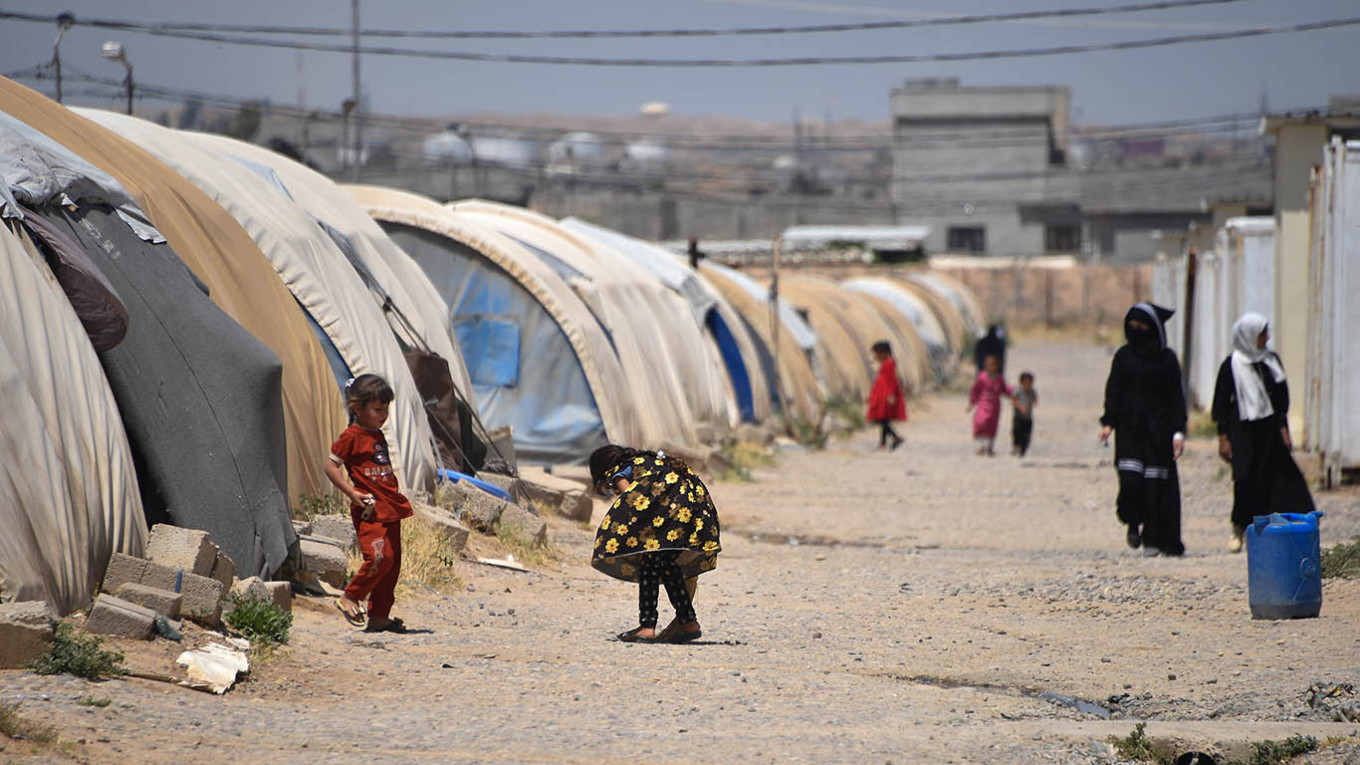“There are around 2,000 childless women from Dagestan in the Al-Hawl and Roj camps, which are managed by Kurdish forces in Syria,” shared L., a Dagestani woman who was recently rescued from the expansive detention center in northeastern Syria. “There are also numerous families with children held there. I don’t have the precise figures, but our living conditions are utterly intolerable,” she added, requesting anonymity for her safety.
Situated close to the Iraqi border, Al-Hawl was initially set up to accommodate Iraqi refugees escaping the Gulf War and later the U.S.-led invasion of Iraq. Currently, it houses thousands of women and children, many of whom are related to Islamic State fighters, under the governance of Kurdish-led forces.
“Women and children experience physical abuse and torture at the hands of the Kurdish authorities,” L. reported. “We lack any legal protection and endure horrific living conditions. Some of us don’t merely live in tents; we reside in latrines repurposed as cells. Even healthy individuals find themselves developing heart problems and contracting tuberculosis in these quarters.”
L. is among numerous individuals categorized as associated with the Islamic State (ISIS), the terrorist organization that captured large areas in Syria and Iraq in 2014 and declared a caliphate. While IS continues to exist in some capacity, the self-proclaimed caliphate collapsed in late 2019 following the battle of Baghuz Fawqani.
In the aftermath, the wives, sisters, and children of ISIS fighters, many of whom are non-Syrians, were relocated to Kurdish-controlled camps in northeastern Syria.
There are no exact statistics regarding how many women and children from Russia and its annexed regions are currently detained within these camps, but a significant number appear to come from the North Caucasus. Families in these camps recount harrowing experiences and express feelings of abandonment by the international community.
Some children have spent their entire lives in detention, either born within the camps or brought in as infants during the final conflicts with ISIS. Others were preschoolers at the time and have little recollection of the group.
“For the past six years, children aged 12 and older have been removed from Al-Hawl, separated from their mothers and effectively imprisoned in facilities for teenagers,” L. explained. “Their living conditions are dreadful. Imagine the trauma they’ve suffered from being taken away from their mothers and siblings. No matter what a mother has done in her past, she is still a mother. Children should not be punished for their parents’ actions.”
L. mentioned that mothers often remain unaware of their sons’ locations. While a few children have been reunited with their families, she described these occurrences as “manipulative gestures” rather than signs of a systematic solution.
“In Roj, this practice doesn’t exist, but even there, Kurdish authorities treat children, including toddlers, with cruelty, both physically and emotionally. When the media is present, they put on a show of kindness. But once the cameras are gone, they reveal their true nature,” she stated.
On social media platforms like Telegram and Facebook, women from the North Caucasus frequently organize fundraisers to acquire warm clothing and blankets for their imprisoned children or to pay off Kurdish guards hoping to secure their release.
“The Chechens have practically negotiated the release of all their citizens. Now, there are significantly fewer Chechen families remaining in these camps,” remarked Ansar Dishni, a representative from NIYSO, a Chechen independence organization.
He added that his organization consistently receives inquiries for assistance in raising the necessary funds for someone’s release.
“There are numerous groups that pay bribes to extricate women and children from the camps — if you can afford to,” said Ali Charinskiy, a member of the Independent Dagestan in Ukraine initiative. “It usually costs around $15,000 to secure someone’s release. I know this because I personally helped rescue one family from the camp.”
Charinskiy also accused Russian officials of pushing disaffected youth towards Syria during the early years of the conflict.
“Prior to 2014, authorities in the North Caucasus were applying pressure on young Muslims who opposed them,” he explained. “The FSB allowed individuals to travel to Syria, doing nothing to stop families from aligning with either the anti-Assad resistance or terrorist groups. Their aim was to eliminate any Muslim youth who might engage in Islamic solidarity or the Dagestani liberation movement. Then Russia intervened in Syria to support Assad and bombed them.”
Dishni supported this perspective, attributing youth radicalization to long-standing repression by Russian authorities.
“The primary cause was strict oversight and persecution by Russian officials. This is what prompted many young families to leave,” he stated.
While Russia played a role in generating the circumstances that resulted in these camps, it has done little to mitigate the crisis.
Within Russia, the situation faced by women and children associated with ISIS is a taboo topic, and even discussing it can result in criminal charges.
In July 2024, theater director Zhenya Berkovich and playwright Svetlana Petriychuk were given six-year prison sentences for “justifying terrorism” due to their play “Finist, the Brave Falcon,” which portrays the stories of Russian women seduced into joining ISIS in Syria. Despite the play’s clear condemnation of ISIS, its content was deemed too politically sensitive.
Conversely, British author Nussaibah Younis’ satirical novel “Fundamentally,” about a London academic attempting to save a former ISIS bride from a Syrian camp, became a bestseller and was shortlisted for the Women’s Prize for Fiction in 2025.
Additionally, Azadeh Moaveni’s nonfiction work “Guest House for Young Widows,” detailing the lives of 13 women connected to ISIS, was recognized as one of the best books of the year by esteemed publications, including The New York Times and The Guardian in 2019.
Experts agree that early intervention is crucial for successful deradicalization. The sooner children can be taken out of these camps, the more favorable their prospects are. Nevertheless, efforts to facilitate returns remain inconsistent.
Although some women and children have been repatriated to the North Caucasus, the process is complex and sluggish.
“We are only aware of a few isolated instances where women who chose to come back from the camps faced criminal prosecution,” stated Dishni from NIYSO.
Generally, in places like Chechnya, families of former ISIS members often do not face significant systematic prosecution, he asserted. While returnees may be scrutinized, these processes rarely lead to persecution.
However, he cautioned that “in Russia, where repression occurs outside the boundaries of law, nobody is completely safe.” Women returning to Chechnya might experience intimidation and harassment, even if not officially charged, he indicated.
Charinskiy, representing Independent Dagestan in Ukraine, disclosed that some Dagestani women deported back to Dagestan were separated from their children and imprisoned.
“This is why many women are apprehensive about returning,” he observed.
“Deciding whether to return or remain is an intensely personal decision,” remarked L., the Dagestani woman. “Everyone has their own hopes and inclinations. Right now, Syria seems like the safer choice.”
Yet, many women express a desire to return home.
“There’s no universal answer,” Dishni pointed out. “Every situation is distinct. We must consider broader dynamics — regional relationships, international policies, and the treatment of returnees.”
He added that in certain situations, reintegrating teenagers into their extended families in the North Caucasus may offer a more humane and stable avenue forward.
“The family framework there is built on mutual support. If these children are surrounded by their loved ones, they may find stability, care, and a path back to normalcy,” he stated.
The political situation in Syria is also evolving. Since the fall of Bashar al-Assad’s regime, the new Salvation Government under President Ahmed al-Shar has expressed intentions to liberate detainees from Kurdish camps and is reportedly in discussions with Kurdish forces — although no tangible progress has yet been achieved.
L. noted that conditions have deteriorated under Kurdish rule, which now seems to be evading responsibility.
“With the advent of new authorities, we are hopeful for the establishment of more transparent and legal processes aimed at freeing the women and children trapped in these camps,” Dishni remarked. “We anticipate that appropriate bodies within the new Syrian government will set up channels for their release and ensure their safety.”
“I’m certain the new government is currently focused on other pressing matters, so the women and children from Roj and Al-Hawl are not their priority. The Kurds, meanwhile, view them as leverage,” Charinskiy added. “It’s unfortunate, but I hope things will change.”

